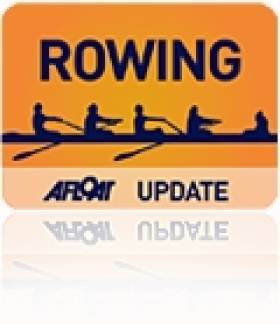Displaying items by tag: CorkBoat Club,
Cork Boat Club Win First Battle at Henley Royal Regatta
# ROWING: Cork Boat Club gave Ireland its first race win at Henley 2012, when they came through their first round test against Cardiff City in the Wyfold for club fours. The Cork crew eked out a lead early on, but Cardiff mounted a challenge right to the end when the pressure told and their steering faltered. Cork won by a length.
Imperial Boat Club, who were seeded, ousted Queen’s University in the Prince Albert for student coxed fours.
Henley Royal Regatta, Day One (Irish interest)
Temple Cup (Eights, Student): Brown University (USA) bt Dartmouth 2½ l, 6:57;
Prince Albert Cup (Coxed Fours, Student): Imperial College bt Queen’s University 1¾ l, 8:07
Wyfold Cup (Fours, Club): Cork BC bt Cardiff City 1l, 7:52; Rob Roy bt Henley B 4l, 7:56





























































